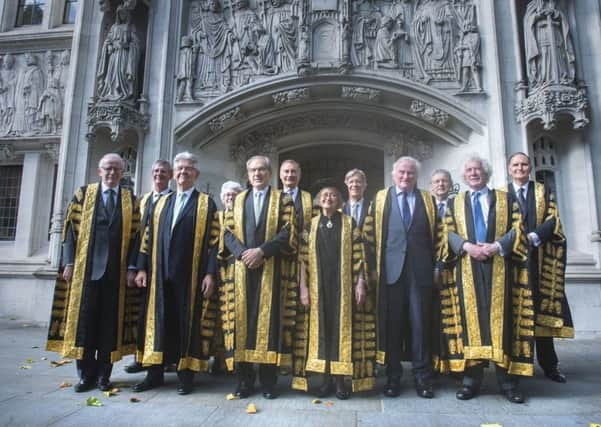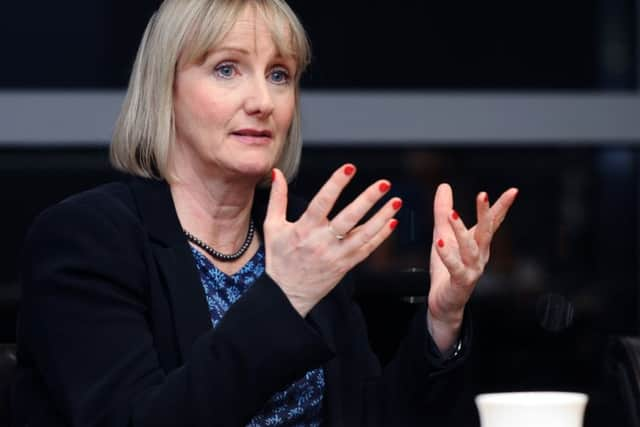Are women breaking the glass ceiling of gender equality?


Last month, Minette Batters became the National Farming Union’s first female leader in its 110-year history.
But Batters isn’t the only woman who’s been smashing glass ceilings recently. History was also made when Sarah Clarke became Parliament’s first female Black Rod - 650 years after the role was created.
Advertisement
Hide AdAdvertisement
Hide AdLady Hale, who last year became the first female President of the Supreme Court - the UK’s highest court, lists off a string of “even more” high profile appointments in the recent past. “We have a female Prime Minister, a female Commissioner of the Metropolitan Police and a female director of Public Prosecutions, so there are quite a lot of us about these days...”


Speaking exclusively to The Yorkshire Post, Leeds-born Lady Hale says progress has been made in the struggle for gender equality in this country. “I’ve been around a long time and the first full-time woman judge in the full-time courts was only appointed in 1962 - the year before I went to university. So things were very different in those days and we’ve come a long way since then and we’ve particularly come a long way this century. That is because people have begun to take this issue seriously and realised that it is a problem which needs to be addressed.”
The issue of gender equality has become a hugely important, and contentious, topic in recent years with disparities in pay and opportunity repeatedly brought into sharp focus. “It’s definitely the case that there are many women going in at the bottom of all sorts of professions and careers. However, there are fewer women finding their way to the top than you would expect.”
Lady Hale, who was brought up in Richmond, in North Yorkshire, has long been a vocal advocate for greater diversity in the workplace. “It’s important for men and women to aspire to be the best they possibly can be, but it’s been easier for young men to see people like them getting to the top than it has been for young women. I’m particularly keen for people to see that Yorkshire women can get to the top, and one message I’ve been pushing for quite a long time is ‘if I can do it, then you can do it.’”
Advertisement
Hide AdAdvertisement
Hide AdShe says some areas have seen a noticeable rise in the number of prominent women in high-profile roles. “It’s become noticeably better in sport in recent years. Someone like Katherine Grainger is very much a role model through her success at the Olympics and is now heading UK Sport and that sort of thing is terrific. However, I suspect there are not nearly enough women in the boardrooms around the country and it’s important that this, too, is addressed.”


The same goes for the vexed issue of equal pay which she concedes has been a “slow burn” despite the fact the Equal Pay Act and Sex Discrimination Act came into effect more than 40 years ago. “This is still an issue partly because we’re not very transparent about how people are paid, particularly in the private sector which makes it difficult for women to know if they’re being paid as much as their male colleagues for doing the same job,” she says.
Lady Hale, who was a pupil at Richmond High School for Girls, says she was encouraged by both her parents and teachers to “aim high” and says she didn’t encounter the same barriers some other women have during their careers.
“There are women who have had to work harder, or try harder, than some of their male colleagues and that’s partly because there are some men, by no means all men, who because of their background and talents have a definite sense that they are entitled to leadership roles, whereas I think there are fewer women who have that same sense of entitlement.”
Advertisement
Hide AdAdvertisement
Hide AdThe legal profession is one that doesn’t have a problem attracting would-be female lawyers, but Kama Melly, QC, based at Park Square Barristers in Leeds, says the challenge is keeping them. “The big issue is around the retention of senior women. That’s the central focus right now because there’s been a significant drop out rate.”
However, attitudes are shifting. “In our chambers we’re seeing more mothers working not just in family law but also in criminal law. In the past this was a very male dominated area of law but it’s changing. There’s more flexible working and attitudes towards women who want to have children are changing, too.”
There’s also growing recognition of the importance that mentors and positive role models can have. “I never really thought about the importance of role models until one night I was talking to my daughter, when she was about eight or nine, about having a female Prime Minister and she said ‘don’t be silly, women don’t do that job.’ I was shocked to hear her say that and it turned out her view was based entirely on the fact that she just hadn’t seen female politicians on the TV. It really hit home just how important it is to see women in these top roles in order for others to emulate them.
“Young women and especially BAME (Black, Asian, and minority ethnic) women need to see women taking on senior roles in all professions, but particularly the judiciary and the government because they are the ones who make decisions that affect our day to day lives and it’s important they reflect the society they’re supposed to represent.”
Advertisement
Hide AdAdvertisement
Hide AdPaula Dillon, a partner at law firm Womble Bond Dickinson, is the first female president of the Leeds Chamber of Commerce in its 150-year history. She says creating gender equality in the workplace is important for a number of reasons. “When younger women, in particular, look at organisations and institutions they need to be able to see themselves in the top positions. If all they see are men of a certain age then they’ll either think they wouldn’t fit in or they don’t want to work there.”
She says there are simple economic reasons why diversity can boost businesses. “All the research suggests the more gender diverse an organisation is the more successful it is. So even if you don’t give a monkey’s about gender equality you should want a more balanced workplace because it drives performance.”
Dillon has championed the need to encourage more girls to study science, technology and engineering, given that just 11 per cent of professional engineers are women.
“Things have improved and there are good schools encouraging girls to consider applying for these courses. Part of the problem is a lack of information and the fact that manufacturing is still often seen as dirty and industrial work, when modern advanced manufacturing is anything but - it’s hi-tech and highly skilled.”
Advertisement
Hide AdAdvertisement
Hide AdThe move towards greater gender equality has undoubtedly gathered momentum, but as Lady Hale points out there is no room for complacency. “A lot is happening now and has happened already this century, but the price of equality, like freedom, is eternal vigilance.”
Nicola Adams becomes a boxer Barbie doll
Yorkshire’s queen of the ring - double Olympic champion Nicola Adams - has been turned into a Barbie doll to tie in with International Women’s Day.
Adams is the first UK star to join toy maker Mattel’s Shero programme - which recognises women who inspire girls with their achievements.
The Leeds-born boxing star said: “My hope is that everything I do helps more people realise they can do anything they put their mind to. Without my own role models, I wouldn’t be where I am today.”
Mattel said it was not planning to put the doll on sale, but its aim was to “inspire conversation” around role models.
The Nicola Adams doll has boxing gloves and her distinctive cropped hairstyle.